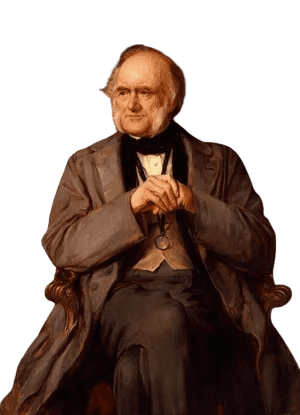Life and achievements
Early life
Charles Lyell was born to a well-off family interested in nature and education on November 14, 1797, in Kinnordy, Scotland. His father, Charles Lyell Sr., was an excellent botanist who taught his son the basics of natural sciences. Lyell was fond of exploring the family properties in the New Forest in England and the Highlands of Scotland as a child, which made him develop an interest in the natural environment and the processes that shaped the Earth. Lyell first enrolled at Exeter College, Oxford, to study classics, but he developed an interest in geology after attending the geological lectures of William Buckland.
During his time at Oxford, Lyell was exposed to the ideas of James Hutton and John Playfair, who laid the foundations of modern geology by proposing the concept of Earth's vast age. Hutton proposed uniformitarianism, which Lyell was to develop further. After finishing his education in 1819, Lyell initially entered the legal profession, but he discovered his true vocation in geology. By 1827, he had left the legal profession to become a full-time geologist and conducted fieldwork in Europe and North America.
His first geological papers brought him to notice, and his increasing fame was further advanced when he was made joint secretary of the Geological Society of London. His work produced Principles of Geology, which shaped his career and the future of geology for many years.
Legacy
Charles Lyell left a significant mark in geology and contributed immensely to understanding the Earth's history through the theory of uniformitarianism. By questioning the established ideas of his contemporaries, Lyell contributed to transforming geology from a speculative discipline into a scientific one that relied on studying facts. His work stressed that the gradual processes of the Earth, such as erosion, deposition, and volcanic activity, were the key factors that formed the Earth's features over millions of years. This concept paved the way for modern geology.
Lyell's work was not limited to geology, as he laid the foundation for Charles Darwin's theory of evolution. Darwin admitted that Lyell's ideas influenced him greatly, and the concept of gradualism helped Darwin imagine natural selection as a process that takes millions of years. The two men were friends, and although Lyell was initially skeptical of evolution, after the publication of On the Origin of Species, he became a supporter of Darwin's theory.
Lyell's work in geology, including his stratigraphic system of classifying rocks and his understanding of volcanoes and earthquakes, is still relevant today. His close attention to detail and adherence to fieldwork protocols provided the foundation for the new standards of geological research. At the same time, his works made scientific knowledge accessible to the general public. Lyell's commitment to the concept that present-day processes could account for past events on Earth helped define geology as a modern science and set a precedent for studying the planet.
Milestone moments
Jul 22, 1830
The first volume of Principles of Geology is published
Charles Lyell's Principles of Geology, the first volume of which was published in January 1830, introduced the idea of uniformitarianism. This idea, which stated that the geological processes happening today also occurred in the past, contrasted with the prevailing catastrophism theory, which asserted that the Earth's features were formed by sudden and violent events.
Lyell's book was based on uniformitarianism, which stated that all the changes that occurred on the Earth were gradual and could be observed. It provided the scientific background for estimating the Earth's age and became one of the foundations of modern geology.
Feb 12, 1832
Marriage to Mary Horner
Lyell married Mary Horner in 1832. She was also a geologist and conchologist. Their relationship was intimate and productive, as Mary often helped Lyell with his research and accompanied him on his geological expeditions in Europe and North America.
Mary's contribution to Lyell's work, especially during their travels, was significant in collecting data and developing Lyell's theories.
Jul 16, 1833
The last chapter of Principles of Geology (Volume 3)
By May 1833, Lyell had finished the third volume of Principles of Geology. This final volume included his systematic descriptions of field observations and further strengthened the theory of uniformitarianism. It also presented his system of dividing geological time into the Eocene, Miocene, and Pliocene periods.
Thus, the publication of Principles of Geology can be considered a significant event in the history of science, making Lyell one of the leading geologists of his generation.
May 17, 1848
Knighted by Queen Victoria
In 1848, Queen Victoria awarded Lyell a knighthood for his service to science, especially geology. This honor was a testament to his rising stature and authority in the scientific community and worldwide.
The knighthood recognized the significance of Lyell's work in geology and his contributions to understanding the Earth's formation.
